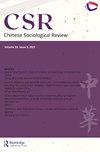Vulnerability and resilience in the wake of COVID-19: family resources and children’s well-being in China
IF 1.4
2区 社会学
Q2 SOCIOLOGY
引用次数: 16
Abstract
Abstract The present study uses data from a 2020 survey conducted in Shaanxi Province during the COVID-19 outbreak to examine the family resources and psychological well-being of four major groups of Chinese children (urban, migrant, rural nonmigrant, and rural left-behind children). The results highlight the complex ways in which family resources intersect with the pandemic to affect these different groups of children. Family economic resources have generally declined across all groups, but left-behind children have suffered the most severe economic shock. However, parent–child relationships for all children have improved across the board during the pandemic. Diminished economic resources act as a risk factor, while improved family relationships play a protective role in children’s psychological well-being. Parent–child relationships have had a more pronounced positive impact on psychological outcomes for migrant and left-behind children, who are the most deprived of parental input under normal circumstances, than for other groups of children. Because of these processes, migrant children and left-behind children fare similarly to urban children in terms of their resilience to the COVID-19 crisis. Among children enjoying especially favorable parent–child relationships, migrant children and left-behind children even appear to have higher psychological well-being than urban children during the pandemic. In comparison to this social impact, the impact of family economic resources is more moderate in magnitude and does not vary systematically across different groups of children. As a result, the positive impact of improved parent–child relationships largely outweighs the adverse effect of reduced family economic resources. Overall, the findings provide new insight into the relationship among disasters, family resources, and child well-being in the context of the COVID-19 crisis in China.2019冠状病毒病后的脆弱性和复原力:中国的家庭资源与儿童福祉
本研究利用2020年新冠肺炎疫情期间在陕西省开展的一项调查数据,对中国四大类儿童(城市儿童、流动儿童、农村非流动儿童和农村留守儿童)的家庭资源和心理健康状况进行了研究。研究结果突出表明,家庭资源与大流行病相互交织,以复杂的方式影响这些不同的儿童群体。所有群体的家庭经济资源普遍下降,但留守儿童遭受的经济冲击最为严重。然而,在大流行期间,所有儿童的亲子关系都得到了全面改善。经济资源的减少是一个风险因素,而家庭关系的改善对儿童的心理健康起着保护作用。与其他儿童群体相比,亲子关系对流动儿童和留守儿童的心理结果产生了更明显的积极影响,这些儿童在正常情况下最缺乏父母的投入。由于这些过程,流动儿童和留守儿童在应对COVID-19危机方面的表现与城市儿童相似。在享有特别良好亲子关系的儿童中,大流行期间流动儿童和留守儿童的心理健康水平甚至高于城市儿童。与这种社会影响相比,家庭经济资源的影响在程度上更为温和,在不同儿童群体之间没有系统的差异。因此,改善亲子关系的积极影响在很大程度上超过了减少家庭经济资源的不利影响。总的来说,这些发现为中国新冠肺炎危机背景下的灾害、家庭资源和儿童福祉之间的关系提供了新的视角。
本文章由计算机程序翻译,如有差异,请以英文原文为准。
求助全文
约1分钟内获得全文
求助全文

 求助内容:
求助内容: 应助结果提醒方式:
应助结果提醒方式:


